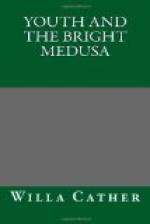Cressida was always at home to her friends on Sunday afternoon unless she was billed for the evening concert at the Opera House, in which case we were sufficiently advised by the daily press. Bouchalka must have been told to come early, for when I arrived on Sunday, at four, he and Cressida had the music-room quite to themselves and were standing by the piano in earnest conversation. In a few moments they were separated by other early comers, and I led Bouchalka across the hall to the drawing-room. The guests, as they came in, glanced at him curiously. He wore a dark blue suit, soft and rather baggy, with a short coat, and a high double-breasted vest with two rows of buttons coming up to the loops of his black tie. This costume was even more foreign-looking than his skin-tight dress clothes, but it was more becoming. He spoke hurried, elliptical English, and very good French. All his sympathies were French rather than German—the Czecks lean to the one culture or to the other. I found him a fierce, a transfixing talker. His brilliant eyes, his gaunt hands, his white, deeply-lined forehead, all entered into his speech.
I asked him whether he had not recognized Madame Garnet at once when we entered the restaurant that evening more than a week ago.
“Mais, certainement! I hear her twice when she sings in the afternoon, and sometimes at night for the last act. I have a friend who buys a ticket for the first part, and he comes out and gives to me his pass-back check, and I return for the last act. That is convenient if I am broke.” He explained the trick with amusement but without embarrassment, as if it were a shift that we might any of us be put to.
I told him that I admired his skill with the violin, but his songs much more.
He threw out his red under-lip and frowned. “Oh, I have no instrument! The violin I play from necessity; the flute, the piano, as it happens. For three years now I write all the time, and it spoils the hand for violin.”
When the maid brought him his tea, he took both muffins and cakes and told me that he was very hungry. He had to lunch and dine at the place where he played, and he got very tired of the food. “But since,” his black eyebrows nearly met in an acute angle, “but since, before, I eat at a bakery, with the slender brown roach on the pie, I guess I better let alone well enough.” He paused to drink his tea; as he tasted one of the cakes his face lit with sudden animation and he gazed across the hall after the maid with the tray—she was now holding it before the aged and ossified ’cellist of the Hempfstangle Quartette. “Des gateaux” he murmured feelingly, “ou est-ce qu’elle peut trouver de tels gateaux ici a New York?”
I explained to him that Madame Garnet had an accomplished cook who made them,—an Austrian, I thought.
He shook his head. “Austrichienne? Je ne pense pas.”
Cressida was approaching with the new Spanish soprano, Mme. Bartolas, who was all black velvet and long black feathers, with a lace veil over her rich pallour and even a little black patch on her chin. I beckoned them. “Tell me, Cressida, isn’t Ruzenka an Austrian?”




